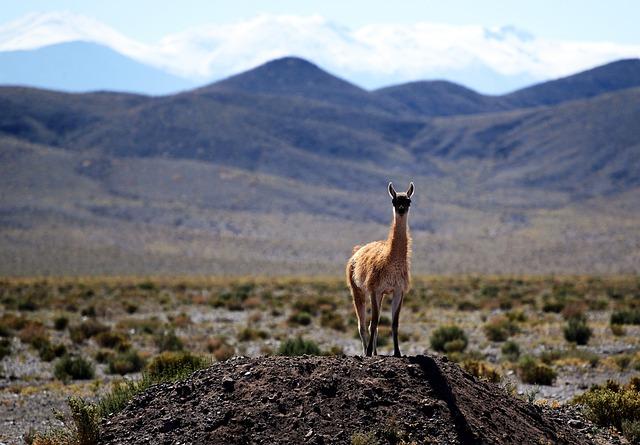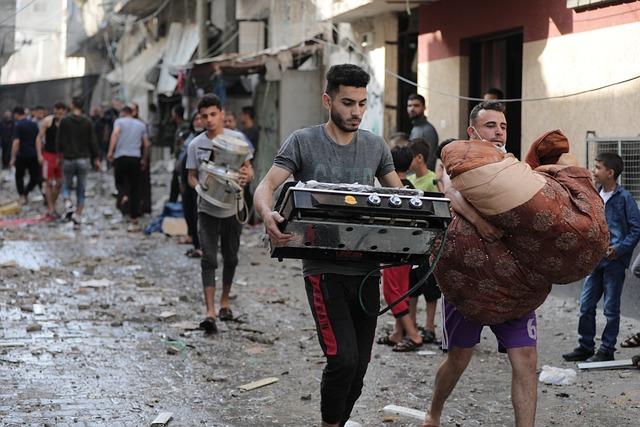Chile is grappling with a severe environmental crisis as raging wildfires continue to threaten communities in the southern regions of the country. In response to the escalating danger, officials have issued evacuation alerts, urging residents to leave their homes to ensure their safety.The situation has sparked widespread concern as firefighters battle the flames,which have been exacerbated by dry weather and strong winds. as the government mobilizes resources and seeks assistance, the impact of these wildfires on the local population and the environment raises urgent questions about disaster preparedness and climate resilience in the face of increasingly severe weather events. This article explores the current state of the wildfires in Chile, the government’s response, and the implications for affected communities.
Evacuation Alerts Issued as Wildfires Intensify in Southern Chile
The raging blazes in southern Chile have prompted local authorities to take immediate action, issuing evacuation alerts for several communities affected by the encroaching flames. As firefighters struggle to contain multiple wildfires exacerbated by hot, dry conditions and strong winds, residents are urged to prioritize their safety and prepare for swift departures. Areas notably under threat include:
La Araucanía
Los Ríos
Biobío
Emergency services are mobilizing resources and personnel to combat the wildfires, which have already consumed thousands of hectares of forest and loss of property is rising. Local officials are coordinating efforts to assist evacuated families, providing temporary shelters and essential supplies. The situation remains fluid, and residents are advised to stay informed through official channels. The anticipated weather conditions suggest that the fires could spread further,complicating containment efforts:
Factors Contributing to Wildfire Intensity
Impact
High temperatures
Increases flammability of vegetation
Strong Winds
Helps fires spread rapidly
Low Humidity
Creates dry conditions favorable for fire
Impact of Climate Change on the Frequency and Severity of Wildfires in chile
The ongoing wildfires in southern Chile exemplify the alarming trend towards increasing wildfire frequency and severity linked to climate change. Rising temperatures, prolonged droughts, and shifting weather patterns have combined to create a volatile environment, making forests and grasslands more susceptible to wildfires. Over recent years, the regions most affected, including Biobío and La Araucanía, have reported a marked increase in fire incidents, with 2023 witnessing some of the most devastating outbreaks on record. This surge is exacerbated by human factors such as land-use changes and inadequate forest management practices, which have further strained the region’s natural resiliency.
Climate change is altering not just the landscape but also the historical patterns of wildfires in Chile. Key contributing factors include:
Increased Temperatures: Average yearly temperatures have risen, contributing to prolonged dry seasons.
decreased Precipitation: Shifts in rainfall patterns have led to extended periods of drought.
Vegetation Changes: Changes in plant species composition can create more flammable environments.
As these conditions intensify, the risks associated with wildfires extend beyond immediate danger. The socio-economic implications are considerable, affecting agriculture, tourism, and local communities. Below is a summary table highlighting these effects:
Impact Category
Details
Economic Loss
Destruction of property and loss of livelihoods for farmers and local businesses.
Health Hazards
Increased air pollution and respiratory issues, especially among vulnerable populations.
Biodiversity Threat
Destruction of habitats, leading to potential extinction of local flora and fauna.
Communities Unite: Local Response and Resilience in the Face of Wildfires
The wildfires sweeping through southern Chile have incited a powerful wave of community mobilization, as residents band together to confront the advancing flames. local organizations, firefighters, and volunteers are working tirelessly to ensure the safety of those at risk. The efforts range from providing immediate shelter and food to coordinating evacuation procedures. In many areas, neighborhood watch groups have emerged, equipped with fire-fighting tools and crucial data sharing, reinforcing the strength of community bonds in times of crisis. This grassroots response demonstrates not only resilience but also the commitment of locals to protect their families and neighbors from the destruction brought on by the wildfires.
In addition to immediate action, towns in the affected regions are also rallying around long-term recovery and support initiatives. Communities are organizing fundraisers and resource drives to address the challenges faced by those displaced. Local businesses are stepping up, donating supplies and services to aid evacuation efforts and support emergency responders. The collective response has sparked an outpouring of solidarity, showcasing the spirit of cooperation and humanitarianism characteristic of Chilean culture. As these communities stand united,they remind the world that in the face of adversity,resilience and hope can flourish amidst the smoke and flames.
Community Actions
Description
Evacuation Coordination
Organizing safe routes and transport for evacuees.
Resource Collection
Collecting food, clothing, and emergency supplies for affected families.
Firefighting Support
Providing volunteers and equipment to assist professional firefighters.
Community Meetings
Holding forums to update residents and discuss safety measures.
Safety Measures and Evacuation Procedures for Affected Residents
As wildfires continue to wreak havoc in southern Chile, authorities are prioritizing the safety of residents living in affected areas. Those who are in proximity to the fires should adhere to the following safety measures to minimize risks:
Stay Informed: Regularly check local news outlets and official government updates regarding evacuation orders and fire progress.
Pack Essentials: Prepare an emergency bag that includes necessary items such as water,food,medications,crucial documents,and a flashlight.
Plan an Evacuation Route: Identify safe routes away from the fire zone, avoiding areas that might potentially be blocked or risky.
Communicate with Loved Ones: Inform family and friends of your evacuation plans and establish a clear meeting point if separated.
In the event of an evacuation order, residents should act swiftly to ensure their safety. Follow these procedures for an efficient and safe evacuation:
Step
Action
1
Gather your emergency kit and important belongings.
2
Evacuate instantly when instructed; do not wait until the last minute.
3
Use designated evacuation routes to avoid blocked areas.
4
Keep your vehicle’s fuel tank full and drive safely to your destination.
The Role of Government and International Aid in Wildfire Management
In the face of escalating wildfire threats, the government plays a crucial role by implementing emergency response protocols and coordinating relief efforts. Local authorities are tasked with maintaining public safety through the issuance of evacuation alerts and the establishment of evacuation centers equipped with essential services. To enhance response effectiveness, the government collaborates with various agencies, including the National Fire Authority and environmental organizations, to optimize resource allocation and ensure timely updates are communicated to affected communities. these actions underscore the significance of administrative preparedness in mitigating disaster impacts.
Meanwhile, international aid serves as a vital lifeline in supporting wildfire management. Countries facing extensive fire damage frequently enough rely on external assistance to bolster their firefighting capabilities. key contributions from international bodies include:
Financial Support: Funds are allocated for firefighting equipment and recovery initiatives.
Expertise Sharing: Countries with advanced firefighting technology and methodology often send experts to assist in crisis management.
Capacity building: Training programs are established to empower local agencies in wildfire prevention and response.
To illustrate the international aid response, the following table represents a summarized view of contributions for recent wildfire incidents:
Country/Organization
Type of Assistance
Contribution Amount
USA
Firefighting Teams
$2.5 million
Germany
Equipment Supply
$1 million
UNDP
Training programs
$500,000
Long-Term Strategies for Preventing Future Wildfires in Chile
In response to the increasing frequency and severity of wildfires in Chile, it is crucial to adopt a multi-faceted approach aimed at long-term prevention. Forest management practices need a notable overhaul,prioritizing controlled burns and the removal of excess underbrush,which can fuel large-scale fires. Additionally,involving local communities in these efforts fosters a sense of ownership and obligation for managing their surrounding landscapes. Education and awareness campaigns can empower residents with the knowledge to identify fire risks and practice fire-safe behaviors.
Investment in technology and infrastructure also plays an essential role in wildfire prevention. The implementation of advanced monitoring systems equipped with satellite imagery and drone surveillance can drastically improve early detection of potential fires. Coupled with this, the creation of strategic firebreaks and access roads ensures that emergency services can respond swiftly to outbreaks, minimizing damage to both natural habitats and human settlements. Establishing a robust legislative framework that supports lasting agricultural practices and limits encroachment into fire-prone areas will further bolster efforts to safeguard this lovely country from the devastation of wildfires.
The Way Forward
As wildfires continue to ravage southern chile,the government’s issuance of evacuation alerts highlights the urgent need for preparedness and response strategies in the face of natural disasters. While firefighters battle the blazes under challenging conditions,communities are rallying together to support those affected by the devastation. Experts warn that climate change and increasing temperatures may exacerbate the frequency and intensity of such fires in the future. As the situation evolves, ongoing coverage will remain crucial to understanding the implications for the region and the steps being taken to safeguard residents. Emergency services and local authorities are urged to remain vigilant, and citizens are called to stay informed as they navigate this crisis.
The post Chile issues evacuation alerts as wildfires rage in the country’s south – ABC News first appeared on Capital Cities.
Author : Capital-Cities
Publish date : 2025-02-23 20:58:59
Copyright for syndicated content belongs to the linked Source.





